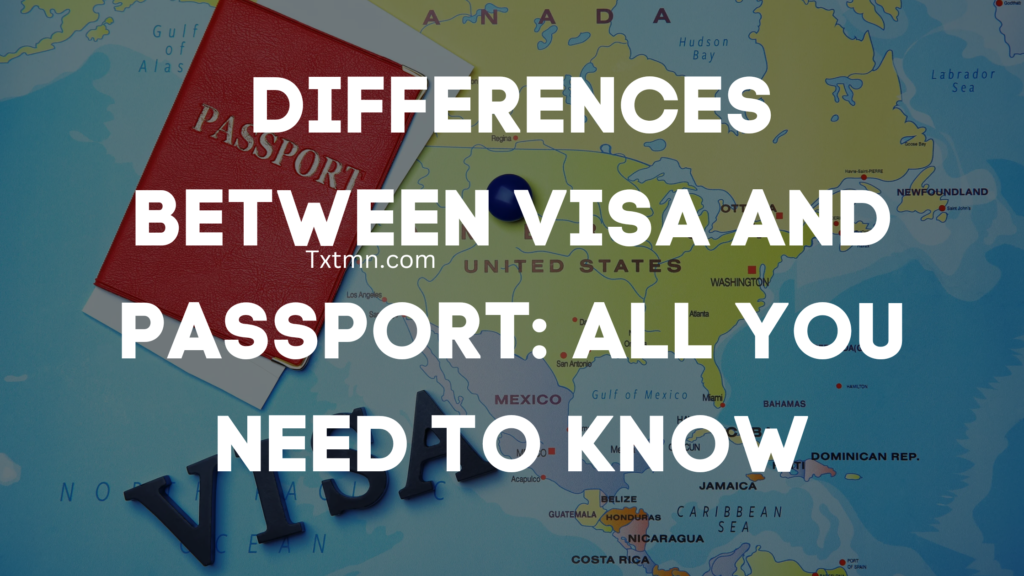Have you ever found yourself tangled in travel terminology and wondered what the difference between Visa and Passport is?
Oftentimes, people mistake a passport for a visa and vice versa. And that’s why we compiled this guide to take away your confusion when it comes to visas and passports.
Even though the two travel documents often get mixed up, they serve distinct purposes.
So, let’s look at what sets them apart.
What is Visa and Passport?
What is a Visa?
A visa is like a VIP pass that grants you permission to enter, stay, or leave a country for a specified period.
It’s a stamp or sticker placed in your passport, issued by the country you plan to visit.
However, Visas can vary widely, from tourist and student visas to work and transit visas, each with its own set of rules and durations.
That brings us to the types of visas.
Visa Types
1. Tourist Visa: For travel and tourism purposes.
2. Student Visa: For studying abroad.
3. Work Visa: For employment or work purposes.
4. Business Visa: For business meetings, conferences, and trade.
5. Transit Visa: For passing through a country en route to another.
6. Refugee Visa: For those seeking asylum or refugee status.
7. Spouse/Partner Visa: For spouses or partners of citizens or residents.
8. Investor Visa: For investors or entrepreneurs.
9. Retiree Visa: For retirees or pensioners.
10. Diplomatic Visa: For diplomats and government officials.
You may also like B2 Visa Sponsor For Extended Family By A H1b: How to Apply
What is a Passport?
Passport on the other hand is your global ID card issued by your home country and confirms your identity and nationality.
It’s your ticket to international travel and allows you to leave and return to your country. Passports come in various types too, such as regular, diplomatic, and official, each serving different purposes.
Let’s talk about the types of passports.
Passport Types
1. Ordinary Passport: For personal travel.
2. Official Passport: For government officials and diplomats.
3. Diplomatic Passport: For diplomats and high-ranking officials.
4. Service Passport: For government employees on official business.
5. Emergency Passport: For urgent travel situations.
6. Temporary Passport: For temporary travel situations.
7. Biometric Passport: With enhanced security features.
8. Electronic Passport: With an embedded microchip.
That being said, where do you use a visa and passport?
Where Do you use Visa and Passport?
Where is a Visa Needed?
Visas are required depending on the country you wish to visit and your nationality.
For instance, if you’re a U.S. citizen traveling to China, you’ll need a visa.
However, if you’re heading to countries within the Schengen Area, you might not need one for short stays.
Where is a Passport Needed?
Your passport is needed whenever you travel internationally.
It’s your primary travel document, required for entry into and exit from countries.
Even if you’re just traveling across the border for a quick getaway, you should not leave home without it!
check out What is the Minimum Bank Balance for Canada Student Visa 2024? Complete Guide
Who Issues Passports and Visa?
Who Issues a Visa?
Visas are issued by the embassy or consulate of the country you wish to visit.
The process can vary and involves online applications, interviews, and sometimes even biometric data.
Who Issues a Passport?
While Passports are issued by the government of your home country.
In the U.S., for example, the Department of State handles passport applications.
The process involves submitting an application, proof of citizenship, and a photo, along with a fee.
Difference Between Visa and Passport
| Differences | Visa | Passport |
| Purpose | visa is a permission slip to enter a specific country | passport is your identification document for international travel |
| Issuing Authority | visas are issued by the country you plan to visit | Passports are issued by your home country |
| Validity | visas are usually valid for a shorter period, depending on the type and country | Passports generally have a longer validity, often 5 to 10 years |
| Physical Form | It is a stamp or sticker within that booklet | passport is a booklet, |
| Necessity | visa is only needed for certain countries | You always need a passport for international travel |
Other Travel Documents You Should Know
Now that we have discussed the difference between visa and passport, let’s talk about other travel documents you should know.
- Travel Permit: For restricted areas or special events.
- Visa on Arrival: Issued upon arrival in a country.
- Electronic Travel Authorization: Online authorization for visa-free travel.
- Passport Card: A less expensive, card-format passport for land and sea travel.
Final Note
In this guide, we have discussed the difference between visa and passport.
Understanding the difference between a visa and a passport can save you from travel headaches.
You should always check the entry requirements for your destination and ensure your documents are in order.
We hope you find this guide helpful.
FAQs
Do I need a visa for every country I visit?
Not necessarily. Visa requirements depend on your nationality and the country you plan to visit.
Can I travel with an expired passport?
No, you need a valid passport to travel internationally. Some countries require your passport to be valid for at least six months beyond your stay.
How long does it take to get a visa?
Visa processing times vary by country and visa type. It can take anywhere from a few days to several weeks.
Can I renew my passport while abroad?
Yes, you can renew your passport at your home country’s embassy or consulate while traveling.
Is a visa guaranteed once I apply?
No, visa approval is at the discretion of the issuing country.
However, ensure you meet all requirements and provide accurate information to increase your chances.
